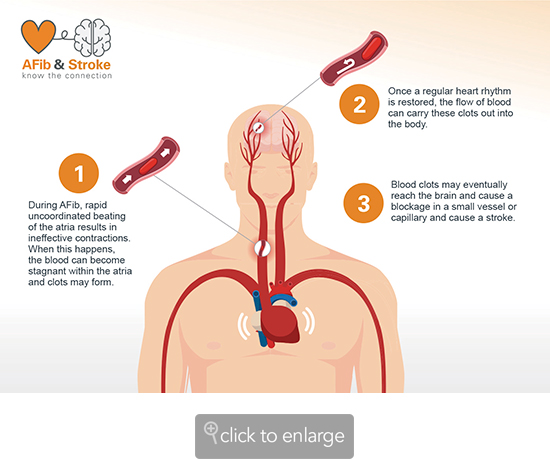In 2020, more than 795,000 people in the United States will experience a stroke, according to a report from the American Heart Association, and nearly a third of those may be caused by atrial fibrillation (AFib) based on research published in “Vascular Health and Risk Management.” AFib is the most common type of cardiac arrhythmia, according to a report by RTI International, and affects more than 5.5 million people in the U.S.
Dr. Rajesh Banker, an AFib expert, an electrophysiologist (heart rhythm specialist), is sharing some information on the AFib-stroke connection.
“AFib is associated with five times the risk of stroke, so it’s important those with AFib or who have AFib-like symptoms seek appropriate medical care,” Banker said. “AFib is characterized by a rapid or irregular heartbeat, which can cause blood to pool in the heart and form blood clots. The blood clot may travel to other parts of the body and ultimately reach blood vessels in the brain, thus creating the potential for a stroke.”

Some AFib patients may not realize they have the condition, and some have no noticeable symptoms. According to the American Heart Association, common symptoms include:
- General fatigue
- Rapid and irregular heartbeat
- Fluttering or “thumping” in the chest
- Shortness of breath and anxiety
- Weakness, dizziness, faintness or confusion
The occurrence of stroke can impact a patient’s quality of life and the ability to perform daily activities. Strokes can cause significant physical, psychological and social impairments, including paralysis, memory loss, depression, personality changes, problems with communication, cognitive impairment and anxiety.
“The risk of having a stroke for people living with AFib is high, and the impact can be detrimental for a patient’s quality of life,” Banker said. “The most important thing someone with AFib can do is meet with a doctor who specializes in heart rhythm issues to discuss possible treatments.”
A doctor can recommend the best treatment option for AFib patients. For some patients, catheter ablation is a good option and has been shown to reduce the risk of stroke by roughly 40%, according to research published by the American Heart Association.
If you or someone you know has AFib, talk to an electrophysiologist to discuss ways to reduce stroke risk, including treatment options. To learn more, or find an electrophysiologist in your area, visit GetSmartAboutAFib.com/stroke.
Photo courtesy of Getty Images (Couple with nurse)
SOURCE:
Biosense Webster
